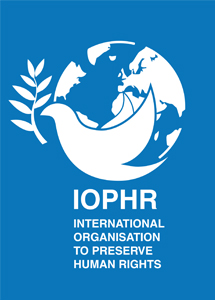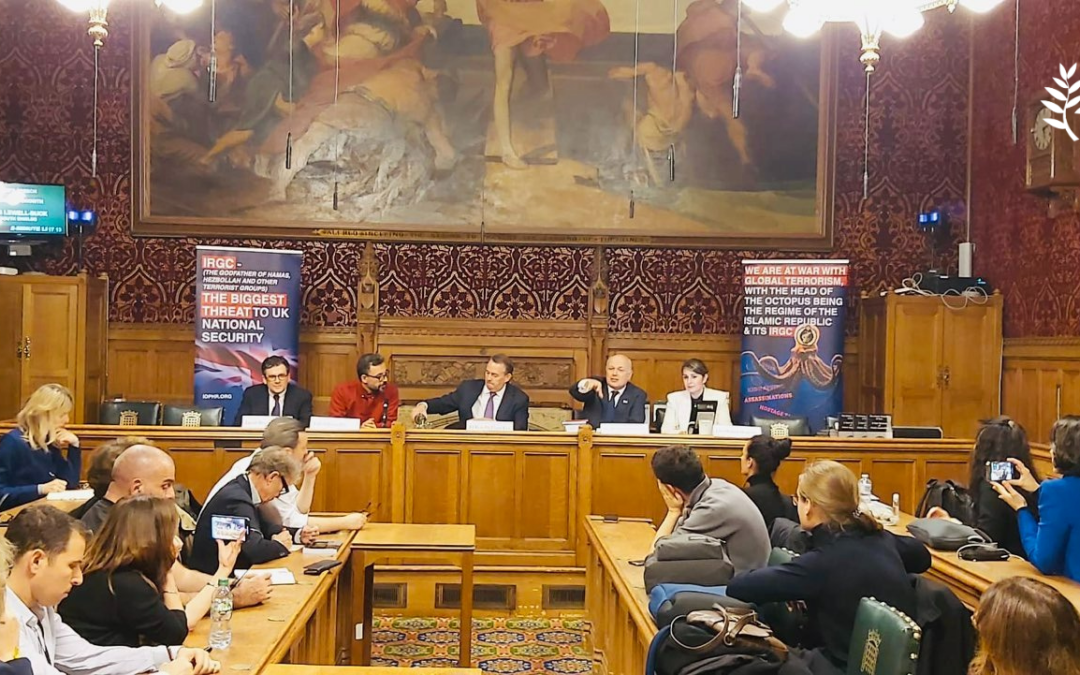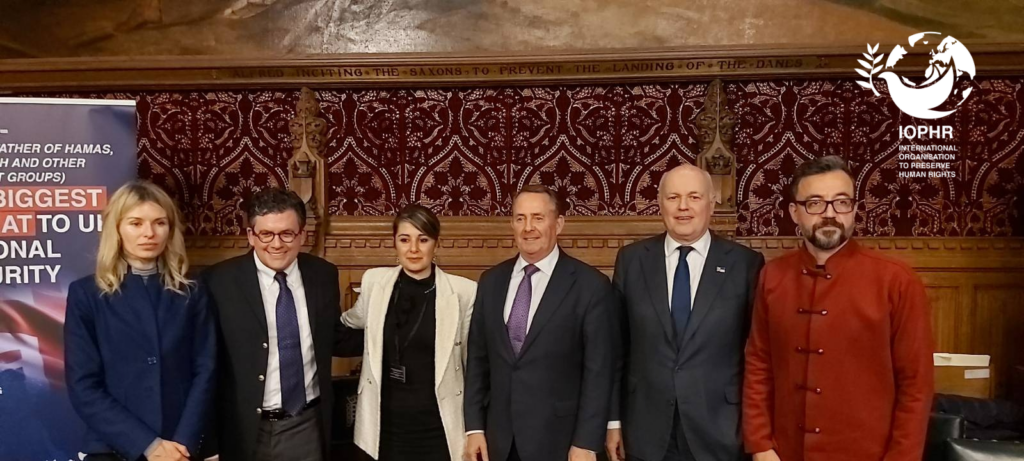Event held on the 14th November 2023 at UK Parliament Committee Room. organised by the IOPHR, hosted by Dr Liam Fox MP
Dr Liam Fox MP
“Iran wants to wreck any possible peace processes between countries in the Middle-East”
The meeting commenced with Dr. Liam Fox MP emphasising the focal point, addressing one of the most severe threats to our security—the IRGC and Iran. Dr. Liam Fox MP, serving as the MP for North Somerset for the past 32 years and chairing the UK Abraham Accords Group, underscored that the West has indulged in wishful thinking for too long. It is now imperative to unequivocally demonstrate the unacceptability of the IRGC, and by extension, the entire Iranian regime.
Dr. Fox stated, “It is our duty to express solidarity with the people of Iran. When we observe the profoundly damaging interference Iran has in Iraq, Syria, through Hezbollah, and Hamas, we cannot turn a blind eye. In the face of such harm, we must not remain inactive. We are aware of Iranian supporters in our own country and Europe. Security services have revealed threats made to Western politicians and Iranian dissidents, even within our borders. It’s time to take decisive action. I have consistently argued, as many of you know, that merely proscribing the IRGC is insufficient. I advocate for going beyond that. For instance, I believe Iran Air should not be permitted to operate out of the United Kingdom. This airline facilitated the Iranian regime in supplying drones to Russia, aiding in the suppression of the people of Ukraine, and, by extension, being complicit in their war crimes. Additionally, I am opposed to having Iranian banks operate in close proximity to the Bank of England—banks that have already faced sanctions in the United States.”
Next, Dr. Liam Fox introduced his parliamentary colleague, Sir Iain Duncan Smith, to the panel. Sir Iain Smith expressed his appreciation for the event, highlighting its cross-party nature with participation from MPs and Lords across different political affiliations. He noted that the views shared in the room cut across party lines, though they might not align with the government’s stance.
Sir Iain Duncan Smith MP
“There is a growth of totalitarian states in the world with China, Iran and Russia as examples. Iran is not an isolated case. World War I and II happened as we then appeased with Hitler and believed when we just give in a little bit, he would be okay and be a good member of Europe. We are at this same stage now and we see history repeat itself.”
Sir Iain Duncan Smith began by underscoring the current global scenario, stating that since the Second World War, the world faces one of the most significant threats, with an increasing number of totalitarian states compared to democratic ones. He emphasised the crucial role played by China in this shift. Regarding Iran, he asserted that it is not an isolated issue but part of a series of totalitarian states expanding their power, with an unstoppable growth trajectory. The alliance between Iran and China, he pointed out, is pivotal, facilitating the supply of Iranian weapons, including drones used in the war against Ukraine.
Drawing historical parallels, Sir Iain Duncan Smith likened the situation to the 1930s when there was a belief that if Hitler was given a little more, he would become peaceful. Expressing bewilderment, he questioned why the UK government has not proscribed the IRGC despite ample evidence of its activities, not confined to the Middle East. Criticising the Foreign Affairs stance, he argued that providing significant sums of money to free hostages, like Nazanin Zagari-Ratcliffe, is not a display of influence but an outright surrender.
Sir Iain Duncan Smith stressed the need to recognise the growing and interconnected threat, extending beyond Iran but with Iran at its apex. He emphasised that this threat challenges fundamental values such as human rights, freedom, democracy, and the rule of law. Concluding, he welcomed all attendees, urging them to contribute to the campaign’s growth to address this pressing issue.
Cllr Mattie Heaven
“Everyone, but especially Muslims need to speak up loud and clear and take a strong stand against the Islamists and Islamic fascists, because all the actions from the IRGC, the Islamic Republic of Iran, Hamas and other terrorist groups in the name of Islam should be condemned.”
Next to speak was Cllr. Mattie Heaven, Director of the IOPHR, who expressed her gratitude for being there and highlighted the gravity of the current situation, marked by the recent brutal attacks on Israel by Hamas. Addressing the changing reality, she emphasised the need to move beyond the warning stage, drawing attention to the protests in the streets of London and the unexpected tension on Remembrance Day.
Mrs. Heaven underscored the global ambitions of the Islamic Revolutionary Guard Corps (IRGC), established 44 years ago, with goals including the eradication of Israel and the establishment of a global Islamic state. Quoting her, “They have a goal, and we can see they’re walking towards their goal.” She criticised the Western approach to Iran, citing appeasement, negotiation, and dialogue, and pointed out recent controversial actions, including the appointment of Iran to the chair of the Human Rights Council of Social Forum.
Heaven urged the UK government to take decisive action against the IRGC, calling for its proscription. She highlighted the recent rise in hate crimes, support for terrorism, and anti-Semitism in the UK, urging stronger consequences for those supporting terrorists and advocating for public education on the complexities of the issue. Mrs. Heaven also issued a passionate call for Muslims worldwide to speak out against extremism, emphasising the duty of every Muslim to denounce violence and hate in the name of Islam. As she concluded, she emphasised the need to take action and maintain pressure to ensure a safer future.
In response to Cllr. Heaven’s speech, Dr Liam Fox expressed gratitude and emphasised two crucial issues that had been raised. Firstly, underscoring the Iranian regime’s dangerous belief in acting on behalf of God, making opposition tantamount to heresy. He also highlighted the lack of awareness in the West about President Raisi’s sinister past, stressing the urgent need for better education and communication to reveal the true nature of the regime.
Jason Brodsky
“The IRGC is not a national army. It’s an ideological army.”
Next to share was Jason Brodsky, Policy Director of United Against Nuclear Iran. Mr Brodsky commended the leadership of Dr. Fox and Ian Duncan Smith while highlighting the clear and present danger posed by the Islamic Revolutionary Guard Corps (IRGC) to the UK, the US, and the international community. Quoting him, “The IRGC is not a national army. It’s an ideological army.” Brodsky emphasised the IRGC’s priority as protecting the Islamic revolution rather than the Iranian people, noting the constitutional afterthought regarding the country’s security.
The speaker underscored the real threat of lone wolf attacks in Western capitals, citing over 15 attempts by the Islamic Republic to kidnap or kill UK-based individuals since 2022. Brodsky labelled these acts as acts of war and highlighted a deterrence problem in the UK and the US. He called for a change in policy response, urging the UK and the EU to signal to Tehran that it will not be “business as usual” by designating the IRGC. Brodsky pointed out an inconsistency in listing IRGC satellites as terrorist organisations but not the IRGC itself, undermining counterterrorism efforts.
In concluding his speech, Brodsky emphasised the IRGC’s destabilising role globally, from arming Russia with lethal drones to funding Hamas. He urged a shift from outdated policies and emphasised the need to listen to the Iranian people, empowering them to rid the world of the evil promoted by the IRGC and its ideology.
In response to Jason Brodsky’s warning about the IRGC threat, Dr. Liam Fox emphasised the critical lesson that while individuals may not perceive themselves in conflict with the Iranian regime, the regime views it differently. He urged a comprehensive understanding of this perspective.
Dr. Fox then shifted focus to the ongoing conflict in the Middle East and condemned Russia’s illegal invasion of Ukraine, acknowledging Lesia Vasylenko, a member of the Ukrainian parliament, for her outspoken stance on international affairs. Welcoming Vasylenko, he expressed privilege in having her presence at the event.
Lesia Vasylenko Ukrainian MP
“Every time that the words IRGC or Iran have been spoken, they could have been substituted by Russia, and it would have been exactly the same.”
Mrs Vasylenko drew striking parallels between Iran and Russia, stating, “Every time that the words IRGC or Iran have been spoken, they could have been substituted by Russia, and it would have been exactly the same.” Highlighting Iran’s significant impact on Ukraine, she revealed the deployment of 2,000 Iranian drones in just 12 months, causing substantial damage and casualties. Vasylenko emphasised the close ties between Iran and Russia, particularly in providing weaponry and human resources to support Russia’s actions in Crimea. She echoed Iain Duncan Smith’s concern about a new axis of terrorist regimes, united by their hatred of the free world, and stressed the need for concrete action against aggression, with a call for strong sanctions and a reevaluation of the world’s stance once oppressive regimes fall. Vasylenko concluded, “It takes some bravery to start imagining, thinking, and planning what kind of world we will live in once good defeats evil.”
Finally, Dr Liam Fox introduced Vahid Beheshti, an Iranian-born British journalist and human rights activist. Dr Fox reminded the audience of Mr Beheshti’s 72-day hunger strike for IRGC proscription, expressing immense admiration for Beheshti’s resilience against threats and intimidation on London streets.
Vahid Beheshti
“If you get rid of Hamas in two weeks time, the Iranian regime creates another Hamas. They have the funds, they have the resources. But we have to go for the head of the octopus. (IRGC)”
Mr Beheshti began by expressing his gratitude to Dr. Liam Fox and others present, for their leadership in advocating for the proscription of the Islamic Revolutionary Guard Corps (IRGC). He acknowledged the collective effort and support, particularly during his 72-day hunger strike outside the Foreign Office to raise awareness about the IRGC’s threat. Beheshti reflected on the recent surge in threats, intimidation, and anti-Semitic incidents in London, linking them to the Iranian regime’s influence.
Beheshti emphasised the urgent need for decisive action, citing the escalating danger faced during the past six weeks. He vividly described the brazen attacks on police officers, the display of images supporting Iranian leaders, and the direct threats against him, including an individual armed with a knife waiting to attack. The surge in anti-Semitism, he argued, had risen by a staggering 1,500% in recent weeks.
He drew attention to the testimonies of terrorist leaders like Hassan Nasrallah of Hezbollah, who openly admitted their dependence on the Iranian regime. Beheshti underscored the importance of understanding the nature of these terrorist organisations and their proxies, cautioning against the mistaken belief that the situation would naturally calm down. He highlighted the critical role of the Iranian people in achieving regional peace, advocating for their support in overthrowing the oppressive regime.
Beheshti explained that IRGC proscription was a crucial first step, sending a strong message of intolerance toward the regime’s actions. He argued that such a measure would resonate with the Iranian people, who were eager for freedom and democracy. Additionally, he proposed targeted strikes against IRGC sites and high-ranking officials in the event of direct Iranian regime involvement in warfare. According to Beheshti, this approach would garner support from the Iranian populace, providing the momentum needed to overthrow the oppressive regime and bring about lasting peace in the region.
In his closing words, Mr. Liam Fox emphasised the importance of directly confronting groups like Hezbollah and questioning the true nature of their resistance. He expressed curiosity about the lack of clarity regarding what these groups are resisting—whether it’s the West, Jews, Israel, democracy, secular law, or the 21st century. Fox highlighted the need for a more substantial engagement in media and politics, moving beyond slogans and demanding a deeper understanding of the motivations behind these entities
During the subsequent Q&A session, topics such as the role of Gulf states in the post-conflict Gaza, concerns about China’s influence, and the actions of UK charities affiliated with Iran were discussed. The panellists emphasised the need for a new Iran policy, discussed the challenges posed by totalitarian states, and called for a united response against despotism.
The closing remarks emphasised the interconnectedness of global issues, the importance of defending democratic values, and the need for a strong and proactive approach to address the challenges posed by terrorist organisations and oppressive regimes.


